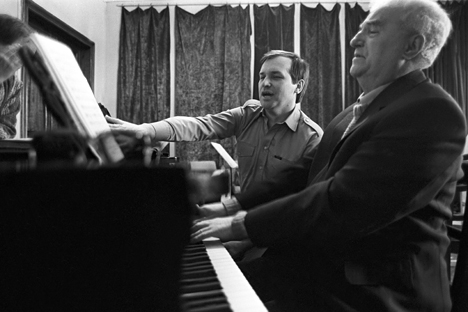
Georgy Sviridov (right), 1986.
Yuri Belinsky/TASSWhile the name of Georgy Sviridov may not ring many bells beyond the borders of the former Soviet Union, there is no one in Russia who does not know his music. Among those of the older generation, even those who are not interested in art listened for decades every evening to the springy and energetic rhythm of Time, Forward! as the background music to the news on the First Channel of USSR Central TV and later on Russian television.
Any schoolchild can hum the tragic romance from the soundtrack of the film The Blizzard – it is often heard outside the concert hall. Sviridov survived all the misfortunes that occurred in Russia in the 20th century and preserved them in his music, giving it a special significance for many Russians.
Source: YouTube
Sviridov was born in a small town in the Kursk Region during WWI. Two years later, during the October Revolution, his father sided with the Bolsheviks and in 1919 was shot by the White Guard, leaving his mother to bring up two children.
Being the widow of a communist, she received assistance from the new government: She was given the choice of a cow or a piano confiscated from the aristocrats. Strangely enough, according to Sviridov's biographers, she chose the piano. She had already noticed her four-year-old son's incredible gravitation towards music.
But he did not learn to play the piano immediately, abandoning his childhood lessons. However, he did teach himself how to play the balalaika, the traditional stringed instrument was played at all Russian celebrations. The teachers at the musical school who worked with him after the family moved to Kursk quickly saw that the boy was musically gifted and recommended that he study seriously.
When he was 17 he moved to Leningrad and entered a musical college that had first-rate teachers and where his classmates were Nikita Bogoslavsky and Vasily Solovyov-Sedoi, two future songwriters destined for fame. It was there that Sviridov also began composing. While still at the college he wrote his romance cycle to Pushkin's poetry, which became extremely popular and was later included in the repertoire of great Russian singers such as Sergei Lemeshev and Alexander Pirogov.
However, the lessons that were truly to shape Sviridov were still to come – at the Leningrad Conservatory. There his teacher was the great Dmitri Shostakovich, who became his friend, mentor and advisor for many years.
Sviridov graduated with top honors from the conservatory, writing the First Symphony and Concert for Strings, which practically coincided with the beginning of WWII. He was immediately mobilized and entered a military academy. Fortunately, several months later he was exonerated from duty because of health problems. His famished childhood during the Civil War and the physical exhaustion of his youth, when he had had to make up for the musical education unattained in his childhood, had taken its toll on him.
Source: YouTube
Nevertheless, the war years were a very intense period for Sviridov. Having joined the Leningrad Philharmonic during its evacuation from Novosibirsk, he composed many works, including those for the theater.
This was a time during which he diligently built up his skills and sorted out his priorities, a time that helped launched Sviridov's career in the 1950s. He had already composed symphonic and instrumental pieces, as well as soundtracks for films and plays – but he was most brilliant when he combined his music with Russian poetry.
For these projects he chose not only the tried and tested poems written by Pushkin, he also selected texts by Alexander Blok and Sergei Yesenin, poets who in the Soviet years were either half-forbidden or half-permitted. But their ability to express the Russian spirit was convincing not only for Sviridov but also for the listeners.
In 1960, his Pathetic Oratorio with poems by Vladimir Mayakovsky won him one of the highest honors in the Soviet Union, the Lenin Prize. He also received two USSR state prizes for his Songs of Kursk and Pushkin's Wreath, as well as the Hero of Socialist Labor medal, something that was extremely rare for artists.
But perhaps what honors Sviridov most of all is that two of Russia's greatest contemporary singers, Elena Obraztsova and Dmitri Khvorostovsky, fought a legal battle for the right to sing his compositions first. Today Sviridov's works are performed constantly in concert halls throughout the country.
All rights reserved by Rossiyskaya Gazeta.
Subscribe
to our newsletter!
Get the week's best stories straight to your inbox